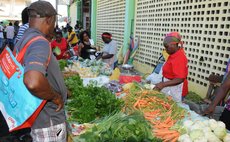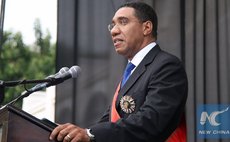CARICOM and Climate Change
On December 12 in Paris, France's Foreign Minister, Laurent Fabius, brought to a close the UN climate change conference, COP 21."I now invite the COP to adopt the decision entitled Paris Agreement outlined in the document," he said, and then seconds later: "Looking out to the room I see that the reaction is positive, I see no objections. The Paris agreement is adopted."
It was, according to some reports, an act of brinkmanship, as unresolved last minute concerns had been expressed by Nicaragua and there was, in a part of the final draft text, a difficulty surrounding US concerns about the use of the word 'shall' rather than the more discretionary word 'should'; but with mysteriously, a typographical error being declared, the deal was done.
Apart from it demonstrating Mr Fabius' outstanding ability to bring to a conclusion a multi-dimensional meeting in which unanimity was required if the world was ever to be able to address climate change; US concerns, driven by domestic politics, demonstrated how hard it may be for nations most at risk to obtain a viable outcome.
Caricom was ready for Paris. A task force had been set up two years ago and the region had a well-prepared position, a short-list of critical issues, and simple but memorable branding. In addition to a delegation led St Lucia's Minister of Sustainable Development, Dr James Fisher, and the Caricom Secretary General, Irwin LaRoque, seven Caribbean Heads of Government travelled to Paris to express, at the opening, the region's concerns, and to mobilise third-party support among the huge numbers of NGO's, business interests, environmentalists and other present in Paris.
It was an outstanding example of where, in the pursuit of a common cause that touches everyone in the region, the regional institution can add real value and be an organisation to be proud of. It demonstrated in relation to important cross-cutting roles, a future for the secretariat.
For the Caribbean and other low lying small nations, for which sea level change and global warming are quite literally existential issues, what now is at stake is whether what has been agreed is deliverable; what the text means in practical terms; and how the region and other Alliance of Small Island States (AOSIS) intend ensuring that the many commitments made are delivered within the agreed time frame.
In outline, the thirty one page text agreed by 193 nations proposes that a balance between greenhouse gas emissions and the sinks for ameliorating them is achieved in the second half of this century. It emphasises the need to hold the increase in the global average temperature well below 2C (36F) above pre-industrial levels, proposes 'pursuing efforts to limit the temperature increase to 1.5C (35F)', and that a peak in global greenhouse gas emissions be achieved as soon as possible. It accepts an asymmetrical approach enabling all developing countries - including large industrialised carbon emitters like China, India and Brazil - to have more time to adapt.
In a section that addresses loss and damage, it agrees a US$100bn annual minimum up to 2030 to enable support for mitigation and adaptation in developing nations, but does not accept there is any basis for compensation for loss and damage by carbon emitters. It also does not set a time scale for reaching greenhouse gas emission neutrality, or say anything about the shipping or aviation industries.
The problem for the Caribbean and all AOSIS' 39 member states is whether what was agreed in Paris is prescriptive enough, or is so hedged round by the potential for opt-outs, delays, and unenforceability as to make it meaningless.
What it suggests that Caricom must now follow through, as the agreement as it stands is little more than an aspirational framework. Together with other AOSIS states it needs to determine how at the UN and in other fora it is going to hold the world to account for what has been agreed, then obtain, and successfully apply some of the money that will be available for both adaptation and mitigation.
This will not just be a test of the Caribbean's staying power and the willingness of its governments to fund and support a continuing focus, but will also require that the region hold to account those countries that it supported during the negotiations. They will need to prove, when it comes to the Caribbean that their expressed concerns reflected more than just a need to obtain a satisfactory agreement. It is a position that will have to be deployed as much with China and Brazil as with the US and Europe.
In this, both Caricom and the Caribbean Community Climate Change Centre (CCCCC) will continue to have a critical role in coordinating the regional effort. But it will also be up to governments to maintain the political momentum, demonstrate a unity of purpose, and to be determined to pay attention to the Caribbean's implementation deficit.
Climate change is an issue on which the Caribbean has had every reason to have its voice heard and be taken very seriously. Fifty per cent of its population and the majority of the region's productive enterprise and infrastructure lie within 1.2 miles of the sea. Its low lying nature, its fragile eco-systems, and extreme weather events demonstrate that it is a prime candidate to benefit from what has been agreed.
While countries in the region are often accused of allowing mendacity to drive their foreign policy, here is an example where the Caribbean deserves a transfer of resources if it, quite literally, is not to disappear beneath the sea.
Climate change also has a strategic importance. It enables the Caribbean to demonstrate an approach that owes more to the future than to the past; it is an issue on which it has a better chance to exert leverage; and one that can deliver national and regional development objectives. It is also an issue on which the region occupies the moral high ground and has popular international support.
Sea levels and water temperatures are rising and it will be some of the world's smallest nations that will suffer first. Logic would therefore suggest that the Caribbean - a region of vulnerable, low or zero carbon emitting states - should be a significant early beneficiary of any resource transfer for adaptation. It is now up to Caricom to make this a public cause.
David Jessop is a consultant to the Caribbean Council and can be contacted at david.jessop@caribbean-council.org
Previous columns can be found at www. caribbean-council.org December 23rd, 2015



